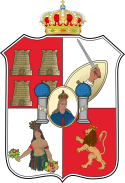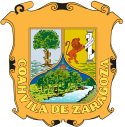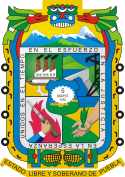Wappen Mexikos
Die Vereinigten Mexikanischen Staaten nahmen im Jahr 1822 ein Wappen an, das bis heute in den Grundzügen das mexikanische Staatsemblem ist. Es zeigt einen Adler auf einem Kaktus (einer Opuntia) auf einem Felsen in einem See, der eine Schlange in den Krallen hält.
Geschichte

Das Wappen bezieht sich auf eine Legende der Azteken über die Gründung ihrer Stadt Tenochtitlan (heute Mexiko-Stadt - Ciudad de México). Der Sage nach hatte ihnen ihr Gott Huitzilopochtli prophezeit, dass sie einen Adler an einem ebensolchen Ort erblicken würden, der eine Schlange zwischen Krallen und Schnabel festhalte, und dort sollten sie siedeln und ihre Stadt gründen.[1]
Während des ersten Kaiserreiches Agustíns de Itúrbide trug der Adler eine Krone. Das Wappen wurde 1823 geändert. Der Feigenkaktus wurde nun auf einem aus dem Wasser steigenden Felsen gestellt und das Ganze umgeben von einem Eichen- und Lorbeerzweig. Das zweite Kaiserreich Maximilians von Mexiko führte ebenfalls den Adler in seinem Wappen, doch wurden Beiwerke der habsburgischen und der französischen (napoleonisches Aussehen des Adlers) Monarchie hinzugefügt. Seitdem wurde das Wappen 1880, 1916, 1934 und letztmals 1968 auf Wunsch von Gustavo Díaz Ordaz geändert. Entworfen wurde es von Francisco Eppens Helguera. Im gleichen Jahr, als in Mexiko auch die Olympischen Sommerspiele 1968 ausgetragen wurden, wurde auch ein neues goldenes Wappen veröffentlicht, das hauptsächlich vom Präsidenten, von den mit Bundesministern vergleichbaren „Secretarios“ und von den Gouverneuren genutzt wird. Während der Amtszeit von Vicente Fox wurde das Wappen von Eppens nicht genutzt, erst wieder unter Felipe Calderón.[2]
Wappen der Regierung
Historische Wappen
1821–1823
1823–1864 und 1867–1893
1864–1867
1893–1916
1916–1934
1934–1968
Wappen der Bundesstaaten
Wappen von Aguascalientes
Wappen von Baja California
Wappen von Baja California Sur
Wappen von Campeche
Wappen von Chiapas
Wappen von Chihuahua
Wappen von Coahuila
Wappen von Colima
Wappen von Durango
Wappen von Guanajuato
Wappen von Guerrero
Wappen von Hidalgo
Wappen von Jalisco
Wappen von México
Wappen von Mexiko-Stadt
Wappen von Michoacán
Wappen von Morelos
Wappen von Nayarit
Wappen von Nuevo León
Wappen von Oaxaca
Wappen von Puebla
Wappen von Querétaro
Wappen von Quintana Roo
Wappen von San Luis Potosí
Wappen von Sinaloa
Wappen von Sonora
Wappen von Tabasco
Wappen von Tamaulipas
Wappen von Tlaxcala
Wappen von Veracruz
Wappen von Yucatán
Wappen von Zacatecas
Siehe auch
- Flaggen und Wappen der Bundesstaaten Mexikos
Einzelnachweise
- ↑ James B. Minahan: The Complete Guide to National Symbols and Emblem. ABC-CLIO, 2009, ISBN 978-0-313-34497-8, S. 718.
- ↑ Hubert de Vries: Mexico Part II. In: hubert-herald.nl. 30. Januar 2014, abgerufen am 16. Dezember 2021 (englisch).
Auf dieser Seite verwendete Medien
Official Seal of the Government of the United Mexican States (Mexico)
Coat of arms of Mexico State
Coat of arms of Mexico (1934-1968)
Coat of arms of Baja California
Coat of Arms of Mexico City, Mexico.
Coat of arms of Chiapas
Coat of arms of Yucatan
Coat of arms of Tabasco
Diseño realizado por el decreto del Gobernador del Estado de Hidalgo, Lic. José Francisco Olvera Ruiz y aprobado por la LXI legislatura del Congreso del Estado Libre y Soberano de Hidalgo. Originalmente diseñado por Diego Rivera, a pedido de José Vasconcelos.
Los campos rojos del escudo, enmarcan sendas torres plateadas de los cuarteles superior izquierdo e inferior derecho, que expresan el valor de sus habitantes, mientras las torres manifiestan la grandeza y poder en la defensa de una plaza. Los navíos de los cuarteles superior derecho e izquierdo indican la condición de puerto marítimo importante y el azul que los enmarca, suma a estas virtudes la pureza de sentimientos, la lealtad y la honestidad. El color plateado de las figuras representa integridad y firmeza. El remate de la corona real simboliza la grandeza y majestuosidad de Campeche.1
Coat of arms of the Second Mexican Empire (1864–1867)
Coat of arms of Sinaloa
Escudo de San Luis Potosí (México) con pergamino
Coat of arms of Coahuila
Coat of arms of Mexico (1893-1916)
Coat of arms of Morelos
Coat of arms of First Mexican Empire
Coat of arms of Tamaulipas
Coat of arms of Guerrero
Official Seal of the Government of the United Mexican States (Mexico)
Coat of arms of Michoacan
Coat of arms of Chihuahua
Coat of arms of Mexico (1823-1864, 1867-1893)
Escudo de Armas de Nayarit
Coat of arms of Mexico (1916-1934)
Coat of arms of Quintana Roo
Coat of arms of Nuevo Leon
Coat of arms of Durango
Coat of arms of Veracruz
Coat of arms of the State of Puebla, according to the Act establishing the State of Puebla coat of arms (http://www.congresopuebla.gob.mx/prensa/tmp/ley_6.pdf)[toter Link]
Coat of arms of Mexico (golden linear)
Escudo del estado de Querétaro Arteaga (México)
Coat of arms of Colima (Mexico); the motto translates to: "The spirit of the arm is force on earth."
Coat of arms of Oaxaca
Coat of arms of Sonora
The royal shield that Charles V & his mother, Queen Juana, granted to the city of Tlaxcala, is made on a red background of which stands out a golden castle with blue doors and windows of three towers, highlighting in the middle a pavilion with a rampant eagle that rules over a gold-colored field, & at the side ends a green palm tree protrudes; on the upper edge are the letters "I", & "K", & "F", & the first two correspond to the initials of the royal couple Isabella of Portugal & Charles V, while the third alludes to the Infante Philip, heir to the throne, & among the spaces of the initials are the two royal crowns that correspond to the aforementioned monarchs, & at the bottom edge you can see in the center 2 yellow bones crossed like blades, & at the ends 2 skulls, the green palm branches symbolize the glory & greatness of Spain & Tlaxcala.
Coat of arms of Aguascalientes
Coat of arms of Baja California Sur. Shades on the coat of arms are as follows:
- PANTONE 534 C
- PANTONE 485 C
- PANTONE YELLOW C
- PANTONE 429 C
Autor/Urheber: unknown, Lizenz:












































































